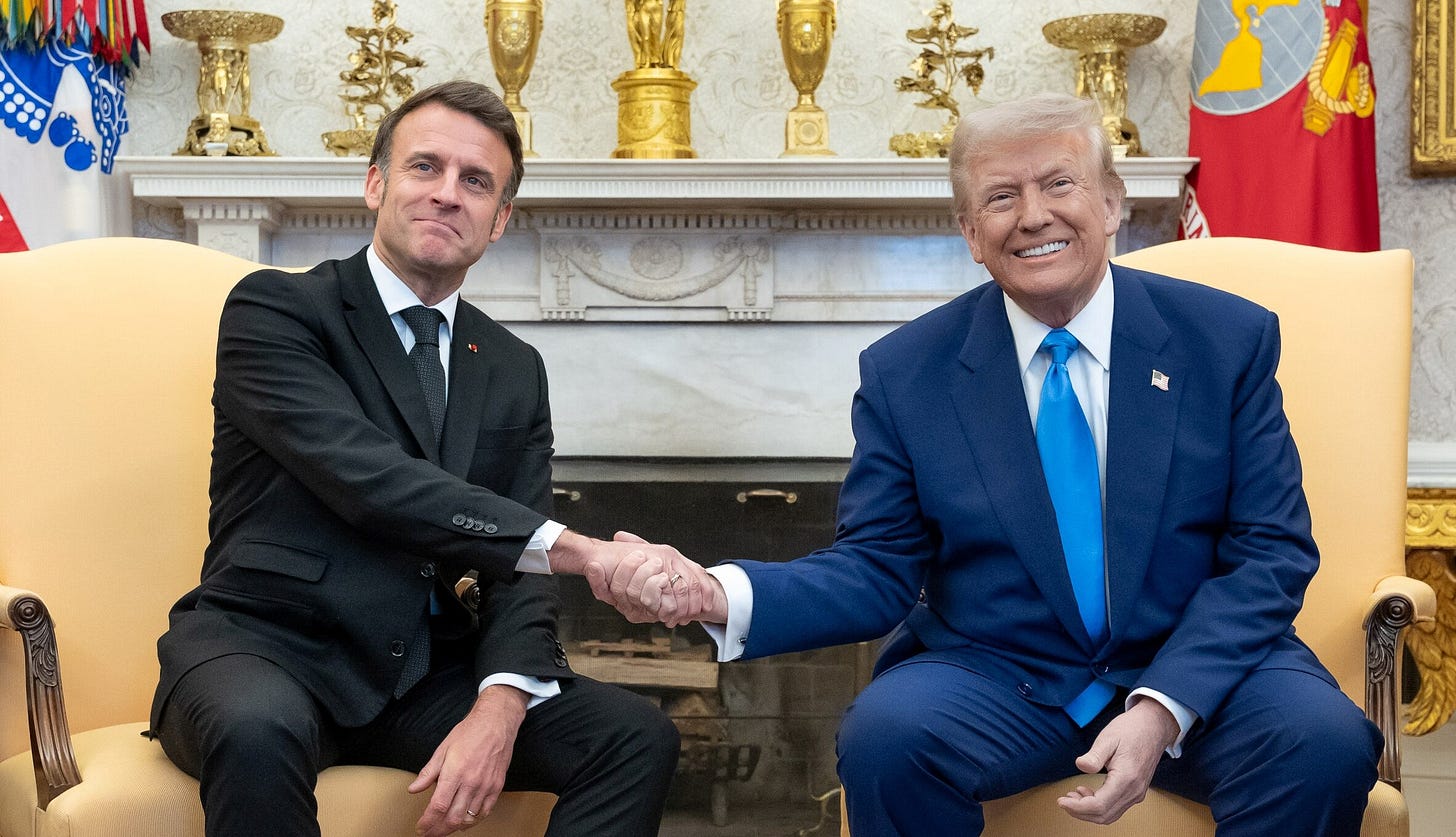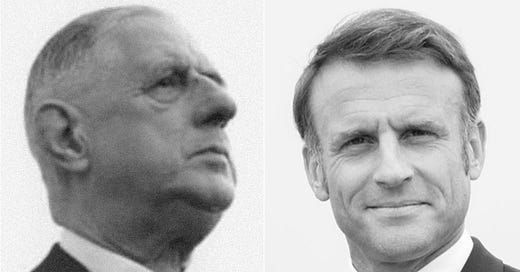Macron, Gaullist in reverse
Macron epitomises European hopes that despite the new Trump-Putin friendship, America will be there for its allies
No matter what America did or said, General de Gaulle never regarded it as a true ally. The Normandy landings, he felt, were a "prelude to a second occupation" of France after the Nazis'. During the Cold War, US security guarantees to Europe were a cover for "hegemony".
As president, De Gaulle repeatedly likened the way America treated Nato partners to the way the URSS treated the eastern bloc. "Everyone is fed up with constant American interference in the Western camp and constant Soviet meddling in the communist camp," de Gaulle told his then-press secretary Alain Peyrefitte in 1964.
Emmanuel Macron, who has often struck a Gaullist pose, is showing a similar reluctance to take Washington at its word. The difference is that Macron isn't ignoring America's status as an ally - he's ignoring Trump's termination, or at least suspension, of that alliance.
This week the French president dashed to the White House in a bid to repair transatlantic ties after a stunning sequence of events. Over the past two weeks Trump and his team have (among other outbursts and in no particular order):
1) unilaterally ended the isolation of Russia, which has conducted the most massive invasion of one European country by another since World War II;
2) made clear America's intention to make a deal on the terms of a power its so-called allies regard as a major threat;
3) blamed Ukraine for the war, calling its president a "dictator" while declining to characterise Russia's as such;
4) repeated Russian talking points, accusing Europe of being decadent and undemocratic;
5) enthused about "investment opportunities" in a rehabilitated Russia;
6) treated past aid to Ukraine as a debt to be repaid – in effect demanding reparations from the victim, not the perpetrator, of an attack;
7) sided with Russia in votes against "allies" at the UN
"Rarely has the US been so at odds with its supposed European allies," as the BBC's Jim Landale remarked. "Rarely" is a euphemism by a diplomatic correspondent. The break with "allies" is unprecedented and this is why Macron wanted to believe it was not set in stone.
After all, who knows whether the ever-unpredictable Trump really meant what he said? And some of the above statements were later qualified. It was worth trying to convince him not to sell out Ukraine and sideline Europe in the negotiations.
Macron put a positive spin on his chat with Trump. He said the two made "substantive steps forward" and "share the same beliefs" of a lasting peace. He added that he had secured a form of "backing" for a European peacekeeping force in Ukraine as part the putative deal with Russia. Some commentators noted that Trump did not contradict his French counterpart on this. The Economist spotted "small but encouraging signs".
Most observers, however, were not so sure. The absence of public humiliation for Macron during his encounter with Trump, while welcome, was hardly an achievement. Smiles and handshakes for the cameras were no substitutes for substantial involvement in negotiations on Ukraine.

But whether you see the glass empty or half full, the judgment is based on the assumption that Europe and the US are still potentially friends. Le Monde – which was unimpressed by the Macron-Trump meeting - spoke of a "growing distance between allies" (the emphasis on "allies" is mine.)
Macron's belief that the US and Europe may still be on the same side is widely shared. Therein lies another difference with de Gaulle's illusion. Sixty years ago, the French president was alone in pretending that Nato had been forced on Western Europe by a hegemonic America. Nowadays virtually all European leaders are convinced democracies on the two sides of the Atlantic naturally belong together.
That expectation underlies Keir Starmer's current visit to Washington. It also explains the shock expressed by Europeans at the Munich Security Conference in mid-February: the normal order of things had been upset by an American team that spent three day picking fights with the Europeans and siding with Russia.
There was dismay when the US defence secretary revealed at the outset it was "unrealistic" to think Ukraine could join Nato or recover regions occupied by Russia. This, many said, amounted to revealing your hand ahead of tough discussions – in effect pre-emptive capitulation.
This point was best put by former Swedish Prime Minister Carl Bildt, who chairs a foreign policy think tank: "It's certainly an innovative approach to a negotiation to make very major concessions even before they have started."
The unstated premise of this remark is that the US administration, like most of Europe, views Russia as the enemy. A more realistic assessment of the situation suggests that on the contrary, Americans have played hard ball in their main negotiations.
They started by saying Ukraine owes the US $500bn for aid received over the past three years - the official figure is $175bn. On that inflated basis, they laid claim in perpetuity to half of state profits from natural resources and infrastructure such as ports. As it fights another predatory power, Kyiv has little leverage. Still, magnanimously, Trump seems willing to settle for just part of its initial demands – while making sure that American taxpayers "get their money back plus". This cannot be described as capitulation.
This is not mean to criticise the Europeans' effort to reach out to the US. What else can they do? And indeed it is still unclear where exactly they stand with the White House. Are they enemies to be defeated, as Trump's declaration that the EU was formed "to screw the US" suggests? Is Europe merely a vassal expected to pay homage? Or does Trump view it as a colony to be exploited, as the historian Timothy Snyder has proposed? No-one knows. And - why not? - the US and Europe may end up remaining allies after all!
The point is that no credible security policy can be based on the best-case scenario. Europeans cannot afford to treat Trump's words and overtures to Russia as an aberration to be corrected through transatlantic dialogue, or Trump himself as an aberration to be corrected by future US administrations.
Sooner or later, the reality principle will prevail. For all his diatribes against American imperialism, de Gaulle sided with the US when it mattered, notably over the Cuban missile crisis and the building of the Berlin Wall. Likewise, European leaders today will have no choice but to accept that going to Washington as supplicants and beg for a place at the negotiating table is not enough.
One common misconception – shared by de Gaulle and Europeans today – is that the US was always the lynchpin of Nato and will continue to be in the long term. In fact, the Atlantic Alliance was a Franco-British idea. Neutrality has historically been the norm for America, as anyone who's read the Founding Father on the subject knows.
Trump's alignment with Putin's politics and worldview may be a passing anomaly. But, in a deeper sense, so is American support for democratic Europe. Nato has endured for because successive US administrations endorsed the Cold War logic put forward by Europeans. In the late 1970s and early 1980s, it was German, French and British leaders who convinced the US to deploy nuclear missiles to counter Soviet SS-20s.
The US is now reverting to its old isolationist stance. Whether this change is permanent or transient, it is time for Europeans to face the fact their way of life depends more than ever on themselves.



